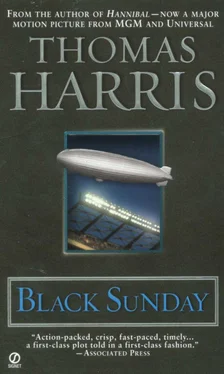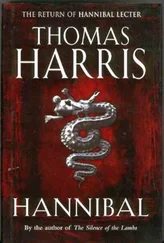“What’s going on? What’s this?” the man at the engine said. Dahlia ignored him. She flipped the two front damps around the handrail. Four more to go.
“Vickers said get the shot bags off,” Lander yelled.
“He said what?”
“Get the shot bags off. Move it!”
“What is this, Mike? I never saw this.”
“Vickers will explain it. TV time costs $175,000 a minute. Now get your ass in gear. The network wants this thing.” Two crewmen undipped the shot bags as Dahlia finished fastening the nacelle. She backed the forklift away. The crew was confused. Something was wrong. This big nacelle with its network markings had never been tested on the blimp.
Lander went to the port engine and looked in. Nothing had been removed. He shut the cowling.
Here came the TV cameraman. “NBS? What is that thing? That’s not ours—”
“The director will explain it. Call him from the bus.” Lander climbed into his seat and started the engines. The crew skipped back, startled. Dahlia was already inside the gondola with the cable cutters. No time to unscrew anything. The TV equipment had to go before the blimp would fly.
The cameraman saw her cutting the equipment loose. “Hey! Don’t do that.” He scrambled into the gondola. Lander turned in his seat and shot the cameraman in the back. A startled crewman’s face in the door. The men closest to the blimp were backing away now. Dahlia undamped the camera.
“Chock and mast now!” Lander yelled.
Dahlia jumped to the ground. She had the Schmeisser out. The crewmen were backing away, some of them turning to run. She pulled the chock away from the wheel and, as the blimp swung to the wind, she ran to the mast and uncoupled it. The nose boom must come out of the socket in the mast. It must. The blimp was swinging. The men had fled the nose ropes. The wind would do it, would twist the blimp free. She heard a siren. A squad car was screaming across the runway.
The nose was free, but the blimp was still weighted with the body of the cameraman and the TV equipment. She swung into the gondola. The transmitter went first, smashing to the ground. The camera followed it.
The squad car was coming head-on with the blimp, its lights flashing. Lander slammed the throttles forward and the great ship started to roll. Dahlia was struggling with the body of the cameraman. His leg was under Lander’s seat. The blimp bounded once and settled again. It reared like a prehistoric animal. The squad car was forty yards away, its doors opening. Lander dumped most of his fuel. The blimp rose heavily.
Dahlia leaned out of the gondola and fired her Schmeisser at the squad car, star fractures appearing across its windshield, the blimp rising, a policeman out of the car, blood on his shirt, drawing his gun, looking up into her face as the blimp passed over. A blast from the machine pistol cut him down, and Dahlia kicked the cameraman’s body out the door to fall spread-eagled on the hood of the patrol car. The blimp surged upward. Other squad cars were coming now, growing smaller beneath them, their doors opening. She heard a thock against the gas bag. They were firing. She aimed a burst at the nearest police car, saw dust kick up around it. Lander had the blimp at fifty degrees, engines screaming. Up and up and out of pistol range.
The fuse and the wires! Dahlia lay on the bloody floor of the gondola, and hanging outside she could reach them.
Lander was nodding at the controls, near collapse. She reached over his shoulder and pressed the syringe beneath his sleeve. In a second his head was up again.
He checked the cabin light switch. It was off. “Hook it up.”
She pried the cover off the cabin light, removed the bulb and plugged in the wires to the bomb. The fuse, to be used if the electrical system failed, must be secured around a seat bracket near the rear of the gondola. Dahlia had trouble tying the knot as the fuse became slippery with the cameraman’s blood.
The airspeed indicator said sixty knots. They would be at the Super Bowl in six minutes.
Corley and Kabakov sprinted to Corley’s car at the first confused report of shooting at the airfield. They were howling up Interstate 10 when the report was augmented.
“Unknown persons shooting from the Aldrich blimp, the radio said. ”Two officers down. Ground crew advises a device is attached to the aircraft.”
“They got the blimp!” Corley said, pounding the seat beside him. “That’s your other pilot.” They could see the airship over the skyline now, growing larger by the second. Corley was on the radio to the stadium. “Get the president out!” he was yelling.
Kabakov fought the rage and frustration, the shock, the impossibility of it. He was caught, helpless, on the expressway between the stadium and the airport. He must think, must think, must think. They were passing the Superdome now. Then he was shaking Corley’s shoulder. “Jackson,” Kabakov said. “Lamar Jackson. The chopper. Drive this son of a bitch.”
They were past the exit ramp, and Corley turned across three lanes of traffic, tires smoking, and shot the wrong way down the entrance ramp, a car was coming, big in their faces, swerving over, a rocking sideswipe and they were down into Howard Avenue beside the Superdome. A screaming turn around the huge building and they slammed to a stop. Kabakov ran to the pad, startling the stakeout team still on duty.
Jackson was descending from the roof to pick up a bundle of conduit. Kabakov ran to the loadmaster, a man he did not know.
“Get him down. Get him down.”
The blimp was almost even with the Superdome now, moving fast just out of range. It was two miles from the packed stadium.
Corley came from the car. He had left the trunk open. He was carrying an M-16 automatic rifle.
The chopper settled down, Kabakov ducking as he ran in under the rotor. He scrambled up to the cockpit window. Jackson put his hand behind his ear.
“They got the Aldrich blimp,” Kabakov was pointing upward. “We’ve got to go up. We’ve got to go up.”
Jackson looked up at the blimp. He swallowed. There was a strange, set expression in his face. “Are you hijacking me?”
“I’m asking you. Please.”
Jackson dosed his eyes for a second. “Get in. Get the belly man out. I won’t be responsible for him.”
Kabakov and Corley pulled out the startled belly man and climbed inside the cargo bay. The helicopter leaped into the air with a great blatting of its blades. Kabakov went forward and pushed up the empty copilot’s seat.
“We can—”
“Listen,” Jackson said. “Are you gonna bust ‘em or talk to them.”
“Bust ‘em.”
“All right. If we can catch them, I’ll come in above them. They can’t see above them in that thing. You gonna shoot the gas bag? No time for it to leak much.”
Kabakov shook his head. “They might set it off on the way down. We’ll try to knock out the gondola.”
Jackson nodded. “I’ll come in above them. When you’re ready, I’ll drop down beside them. This thing won’t take a lot of hits and fly. You be ready. Talk to me on the headset.”
The helicopter was doing 110 knots, gaining fast, but the blimp had a big lead. It would be very close.
“If we knock out the pilot, the wind will still carry it over the stadium,” Jackson said.
“What about the hook? Could we hold him with the hook, pull him somewhere?”
“How could we hook on? The damn thing is slick. We can try if there’s time—hey, there go the cops.”
Ahead of them they could see the police helicopter rising to meet the blimp.
“Not from below,” Jackson was yelling. “Don’t get close—” Even as he spoke the little police helicopter staggered under a blast of gunfire and fell off to the side, its rotor flailing wildly, and plunged downward.
Читать дальше












